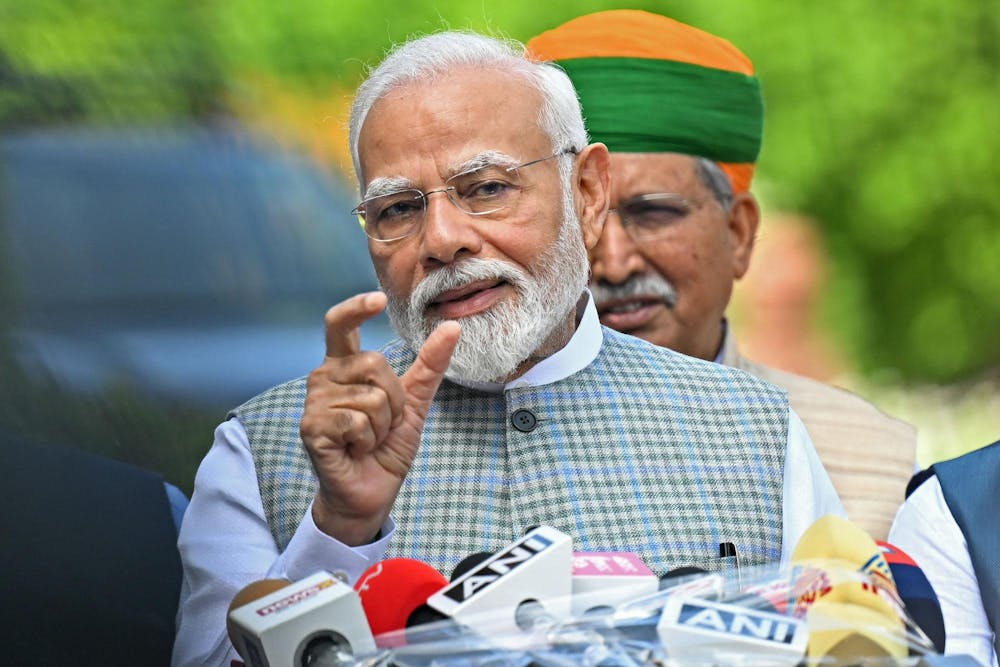Editor’s Note: This story includes mention of potentially triggering situations, such as Islamophobia and hate crimes.
This year is the election year with more than 50 countries including the U.S. going to the polls. The world’s largest democracy and my home country, India, will hold its 18th Lok Sabha (House of the People or the lower house of the parliament) election this April. Over 950 million registered voters are getting ready to vote in an election that will span over a month. Incumbent Prime Minister Narendra Modi is seeking his third term in office which — spoiler alert — he most probably will win.
So, why does this election need global attention? Over the past few years, India’s global influence has been on the rise. Regaining its 5th position in world GDP rankings after the pandemic with a 4 trillion-dollar GDP, it stands strong in the 4th position when it comes to military strength.
Recognition of this force is seen in the U.S., Japan and Australia partnering with India to form the Quadrilateral Security Dialogue or Quad. The Quad was created to increase Western presence in the Indo-Pacific region and counter the influence of China. India is now looked upon as a country on the rise and the only democratic institution in the proximity of China to the West. This rhetoric is evident in a 2022 statement from Secretary of Defense Lloyd J. Austin — “Today, we are positioning the U.S. and Indian militaries to operate and coordinate more closely together than ever.”
The rise in U.S.-India cooperation is not only militaristic but also economic, with American companies viewing the Indian market as a lucrative business opportunity. In the U.S., Indians represented the 2nd highest number of immigrants. 2023 saw India host its very first G-20 summit with a prioritization of issues like green development, digital public infrastructure and women-led development. All these factors represent the rise of India on a global scale, making the 2024 election an election of great importance.
This upcoming national election looks like a favorable one for the incumbent Narendra Modi. Modi champions an authoritarian nationalist brand of politics that feeds on a unified Hindu cultural identity as its main electoral base. Now, these are a lot of foreign terms to digest, but as a rule of thumb, we could consider him to be an electorally successful Indian Trump.
His brand of politics is what I wish to highlight to my Western audience as a point of concern. The media construction of Indian elections in the West has mostly been about how Indian elections are carried out and how it has always been a beacon of democracy. I see a change now with India’s increasing influence and rise in authoritarian nationalistic politics.
Modi’s politics have changed over the years. He was the Chief Minister (governor equivalent) of Gujrat for more than 12 years and now holds the most powerful political position in the country of prime minister for almost 10 years. That is a career spanning over 20 years at highest level of Indian politics. It is a large task to summarize his politics, but his primary explicit rhetoric has been that of economic development and ending poverty.
This explicit stance hides a sinister implicit rhetoric, which is essential for political mobilization. His main electoral strategy entails creating a common enemy. The creation of a common enemy is through a process of manufacturing a homogenous cultural identity. To draw parallels to American politics we could think of this homogenous identity as like the rhetoric of race being irrelevant or the idea of not seeing race.
In the Indian context, this homogenous identity is created by appealing to all Hindu castes and everyone who identifies with “Hindu culture.” In the political context, Hindu culture is this arbitrary idea created to oust people who don’t believe in Hinduism or the principles of Hindutva. What this entails is a notion that all good values of Indian democracy and secularism are because India is a Hindu-majority country. This clearly shows the weaponization of religion to undermine the constitutional promise of unity in diversity to achieve electoral means.
Weaponization of religion does make Modi electorally successful but that success comes at a cost. The cost is rising Islamophobia. Religious hate crimes against Muslims have risen since Modi’s takeover in 2014. Hate crimes range from Anti-Muslim hate speech to gruesome mob lynching of Muslims. Almost 200 million Muslims call India their home — Modi’s regime has led to the marginalization of this population. Narendra Modi is complicit in these hate crimes because of his silence — failure to condemn the rise of Islamophobia and profiting off it.
Modi’s majoritarian politics with explicit support for a particular religion has led to a rise in Hindu extremism. Extremism of all forms is dangerous, especially in the largest democracy in the world. Even if Modi wins in 2024, I want his tale to be seen as a tale of caution for people to keep an eye out for extremism in today’s world. This is because authoritarian extremists don’t overtly advocate for violence or hate against a community. They subtlety infiltrate a country’s polity by providing temporary economic relief like Modi with his free ration scheme or building toilets scheme. This wins people’s confidence and then they eventually reveal their true agenda of extremism and hate which is seen through symptoms like rising hate crimes.
India is a very good case study of how modern democracies slide down a path toward hate and authoritarianism. As we head to polls this year, we must recognize our responsibility of maintaining the spirit of democracy and be vigilant of extremist tendencies in our respective republics.
Advait (he/they) is a freshman studying economics and sociology.






